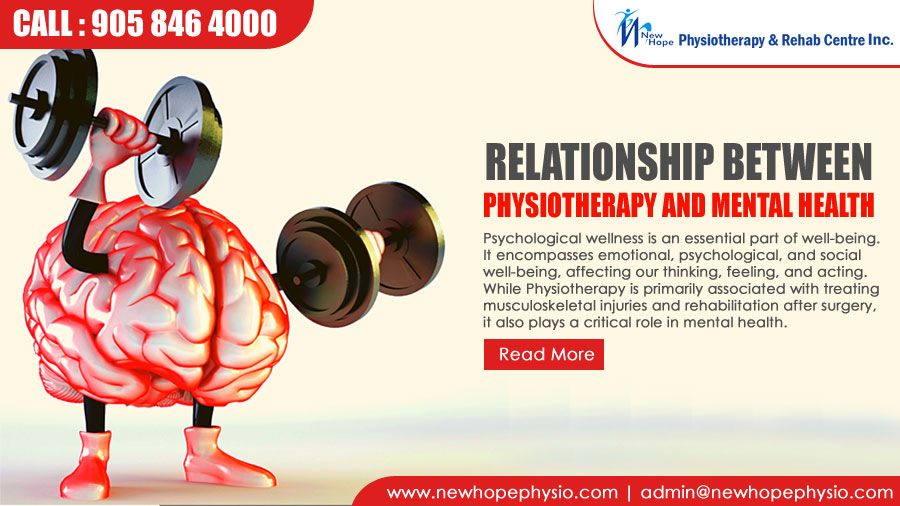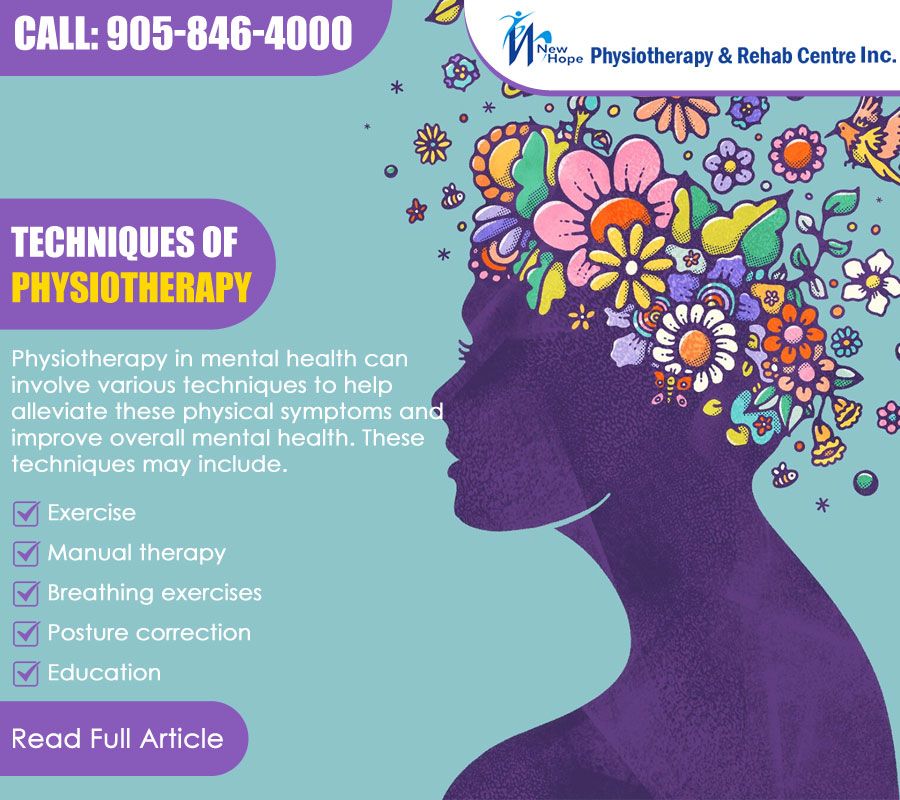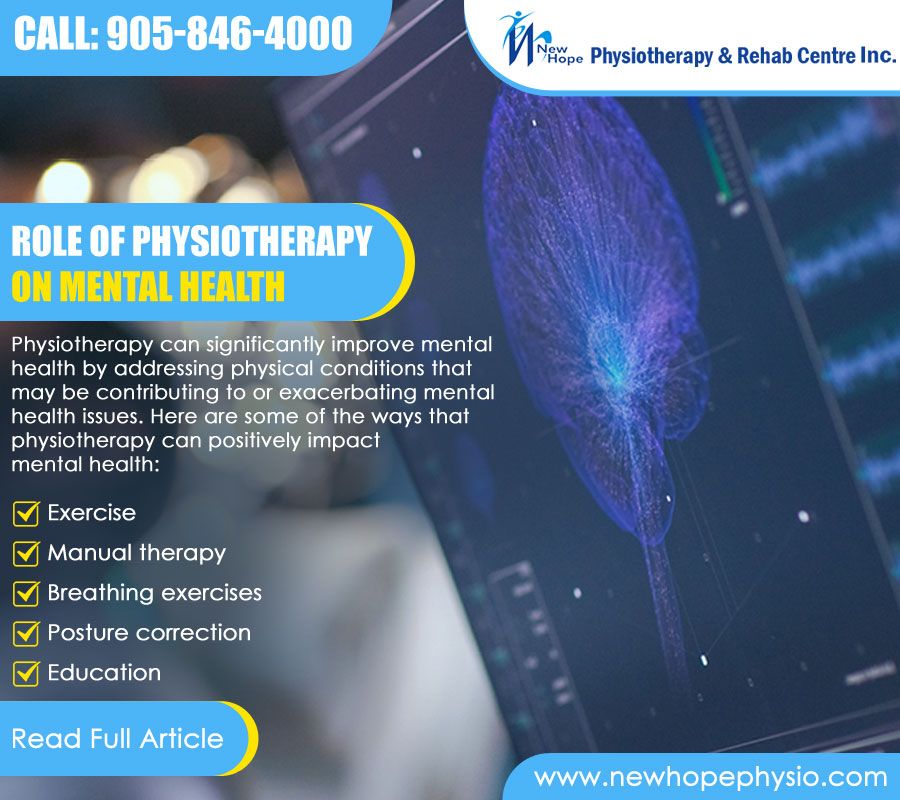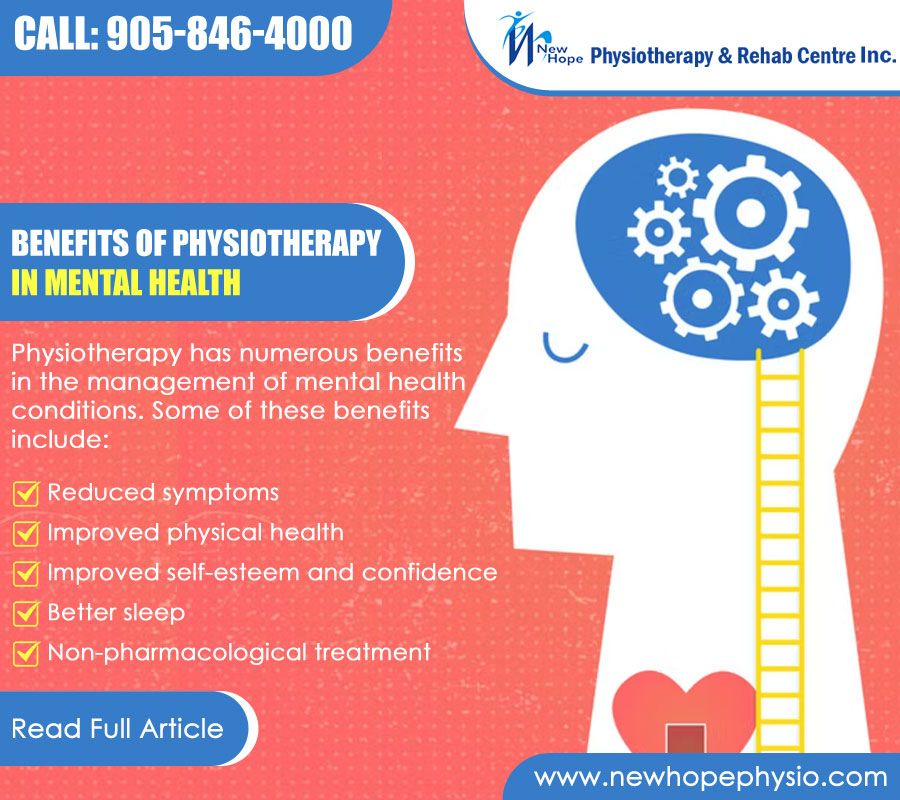
Welcome to New Hope Physiotherapy
- Brampton 905-846-4000
- Malton 905-364-3900
- Orangeville 519-217-9300
- admin@newhopephysio.com
- Home
- Blog
The Relationship between Physiotherapy and Mental Health
 19 Mar 2023
19 Mar 2023
- Comments
- 1070
The Relationship between Physiotherapy and Mental Health
The Relationship between Physiotherapy and Mental Health : Psychological wellness is an essential part of well-being. It encompasses emotional, psychological, and social well-being, affecting our thinking, feeling, and acting. While Physiotherapy is primarily associated with treating musculoskeletal injuries and rehabilitation after surgery, it also plays a critical role in mental health.
Physiotherapy interventions can manage mental health conditions such as anxiety, depression, stress, and other psychiatric disorders. This article explores the relationship between physiotherapy and mental health, highlighting the benefits of physiotherapy in managing mental health conditions.
Also Read : 10 Exercises To Help Relieve Knee Pain
The Relationship between Physiotherapy and Mental Health:
Physiotherapy and mental health are closely related, involving the human body and mind. Mental health conditions such as anxiety, depression, and stress can cause physical symptoms such as headaches, muscle tension, and fatigue. Physical therapy can help alleviate these symptoms by addressing the underlying physical issues contributing to mental health problems.
Physiotherapy interventions such as exercise, manual therapy, and relaxation techniques can help manage the symptoms of mental health conditions. Exercise has been shown to reduce anxiety, depression, and stress by releasing endorphins, improving sleep, and reducing muscle tension. Exercise can also help improve self-esteem and confidence, which is essential for good mental health.
Also Read: World Mental Health Day 2025 – New Hope Physiotherapy
Manual therapy, such as massage, can also help manage mental health conditions. Massage has been shown to reduce anxiety, depression, and stress by promoting relaxation and reducing muscle tension. It can also improve circulation and reduce pain, improving mental health.
Relaxation techniques like deep breathing, meditation, and progressive muscle relaxation can also help manage mental health conditions. These techniques can help reduce anxiety and stress by promoting relaxation and reducing muscle tension. They can also improve sleep, which is crucial for good mental health.
Also Read : The Role Of Physiotherapy In Sports Injury Rehabilitation
Techniques of Physiotherapy
Physiotherapy in mental health can involve various techniques to help alleviate these physical symptoms and improve overall mental health. These techniques may include:

1. Exercise: Physiotherapists may design exercise programs to help improve physical health, increase energy levels, and reduce stress.
2. Manual therapy: Techniques such as massage therapy, joint mobilization, and stretching can help alleviate muscle tension and improve circulation.
3. Breathing exercises: Physiotherapists can teach breathing exercises that help reduce anxiety and improve mental focus.
Also Read: 10 Gentle Workouts to Help Lower Back Pain at Home
4. Posture correction: Poor posture can contribute to muscle tension and pain. Physiotherapists can help patients improve their posture to reduce these symptoms.
5. Education: Physiotherapists may provide education on lifestyle changes that can improve physical and mental health, such as diet and sleep hygiene.
Also Read : What Are Foot Massages? – Techniques And Benefits
Role of Physiotherapy on Mental Health
Physiotherapy can significantly improve mental health by addressing physical conditions that may be contributing to or exacerbating mental health issues.
Here are some of the ways that physiotherapy can positively impact mental health:

1. Pain Management: Physiotherapy can help manage pain, often associated with mental health issues such as anxiety and depression. Chronic pain can lead to feelings of hopelessness and despair, which can further exacerbate mental health problems.
2. Exercise Therapy: Exercise is effective in reducing symptoms of anxiety and depression, and physiotherapists can help design an exercise program tailored to an individual’s specific needs and goals. Exercise can also help with stress reduction and improve sleep quality.
3. Rehabilitation: Physiotherapy can help individuals recover from physical injuries or conditions, improving their overall quality of life and boosting their self-esteem. This can certainly affect psychological wellness and prosperity.
4. Education and Counseling: Physiotherapists can educate individuals on self-management techniques to help them manage their condition and improve their mental health. They can also provide counseling and support to individuals struggling with their physical condition’s emotional and psychological impact.
5. Relaxation Techniques: Physiotherapists can teach relaxation techniques such as deep breathing, progressive muscle relaxation, and mindfulness meditation, which can help individuals manage stress and anxiety.
Overall, physiotherapy can play a valuable role in supporting mental health by addressing physical issues that may contribute to or exacerbate mental health problems and promoting physical activity, pain management, rehabilitation, education, counseling, and relaxation techniques.
The Scope of Physiotherapy In Mental Health
Physiotherapy is a healthcare profession that physically rehabilitates individuals who have suffered from injury, illness, or disability. While physiotherapy is traditionally associated with physical conditions, it can also play a significant role in managing and treating mental health conditions.
Mental health conditions can significantly impact an individual’s physical health, and physiotherapy can help address some of these physical symptoms. For example, individuals with depression or anxiety may experience muscle tension, fatigue, and poor sleep, which can be addressed through exercise and movement-based interventions provided by physiotherapists.
Physiotherapy can also help improve the overall health and well-being of individuals with mental health conditions by encouraging them to engage in physical activity, which has been shown to impact mental health positively. Additionally, physiotherapists can work with individuals with mental health conditions to develop strategies to manage stress, improve relaxation, and promote a healthy lifestyle.
Also Read : Effective Ways Acupuncture Can Help In Weight Loss
Benefits of Physiotherapy in Mental Health
Physiotherapy has numerous benefits in the management of mental health conditions. Some of these benefits include:

1. Reduced symptoms: Physiotherapy interventions such as exercise, manual therapy, and relaxation techniques can help reduce the symptoms of mental health conditions such as anxiety, depression, and stress.
2. Improved physical health: Physiotherapy can help improve physical health by addressing underlying physical issues contributing to mental health problems. Exercise can improve cardiovascular health, reduce inflammation, and promote overall wellness.
3. Improved self-esteem and confidence: Physiotherapy can help improve self-esteem and confidence by promoting physical fitness and mobility. This can lead to improved mental health and well-being.
4. Better sleep: Physiotherapy interventions such as exercise and relaxation techniques can help improve sleep quality, which is crucial for good mental health.
5. Non-pharmacological treatment: Physiotherapy provides a non-pharmacological treatment option for managing mental health conditions. This is especially important for individuals who may not want to or cannot take medications for various reasons.
Also Read : What Is Neurological Physiotherapy?
Conclusion
Physiotherapy is a vital aspect of mental health management. It provides a non-pharmacological treatment option for managing mental health conditions such as anxiety, depression, and stress. Physiotherapy interventions such as exercise, manual therapy, and relaxation techniques can help reduce symptoms, improve physical health, and promote overall wellness.
Physiotherapy can also improve self-esteem and confidence, which is essential for good mental health. Therefore, incorporating physiotherapy interventions into mental health management can improve outcomes for individuals with mental health conditions.
Also Read : Guidelines To Find The Right Orthotic For Your Feet
FAQs
Q1. What conditions can physiotherapy help with related to mental health?
Physiotherapy can help with various physical conditions related to mental health, including chronic pain, fatigue, decreased mobility, and stiffness. It can also help with anxiety, depression, and stress.
Q2. What are relaxation techniques?
Relaxation techniques, such as deep breathing, progressive muscle relaxation, and visualization, promote relaxation and reduce stress.
Q3. What types of physiotherapy techniques are used for mental health?
Physiotherapy techniques used for mental health may include exercise, massage, relaxation, and cognitive-behavioral therapy.
Q4. What is cognitive-behavioral therapy?
Cognitive-behavioral therapy is a form of talk therapy that focuses on identifying and changing negative thought patterns and behaviors. It can help individuals manage mental health conditions by changing their response to stressors.

Recent Posts
All Categories
- Acupuncture
- Arthritis
- Back Pain
- Chiropractic
- Chronic Pain
- Cupping Therapy
- Exercise
- Fibromyalgia
- Hamstring Pain
- Headaches
- Health
- Injury Clinic
- Joint Pain
- K Taping Therapy
- Knee pain
- Laser Therapy
- Manual Therapy
- Massage Therapist
- Massage Therapy
- Mental Health
- Motor Vehicle Accident
- Neck Pain
- Nerve pain
- Orthotics
- pelvic floor physiotherapy
- Physiotherapy
- Sciatica Pain
- Scoliosis Exercises
- Shockwave Therapy
- Shoulder pain
- Sports Physiotherapy
- VRT
- 905-846-4000
- 905.846.2100
- Kennedy Road & Sandalwood Road Unit#1, 170 Sandalwood Prky East Brampton, ON. L6Z 1Y5
MALTON
- 905-364-3900
- 905.676.9499
- Airport Road & Drew Road Unit# 139, 2960 Drew Rd. Mississauga, ON L4T 0A5
ORANGEVILLE
- 519-217-9300
- 519.217.9588
- Hwy 9 & Rolling Hills Drive Unit #4 , 50 Rolling Hills Drive Orangeville, ON L9W 4W2



Leave a Comment